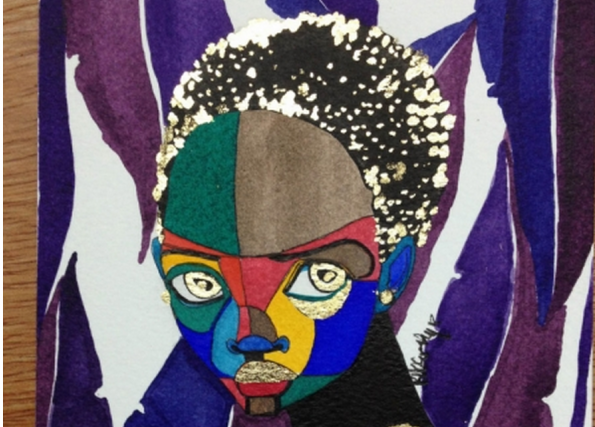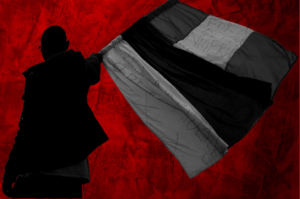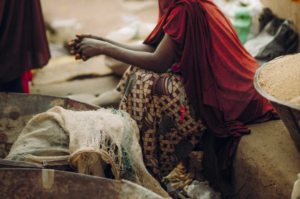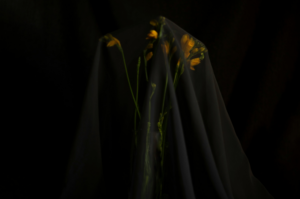“Groundnuts!” she called. “Buy your groundnuts!”
The black hijab that covered her head and shoulders was stained with dust and sweat. What could be seen of her simple blouse and wrapper were faded and threadbare. She easily balanced a tray heaped full of nuts on her head as she wove through the market crowd. She looked to be ten or twelve years old, though her kohl-lined eyes and rouged lips gave her and oddly adult look. She appeared no different from the vast numbers of children who choked the dirty roadways between market stalls hawking everything from batteries to vegetables.
She spotted him just as she was about to call out again. He looked like a tourist: tall, with a backpack and white Panama hat. He was standing in front of a stall that sold bright cloth making clumsy attempts to negotiate for a bolt. The stall’s owner was smiling through the friendly banter; it was the smile of a wolf licking its chops before the kill.
She marked him as she passed him. She had to make sure she was right before alerting her sisters. They could not afford another mistake.
Once out of sight, she put down the tray, sliding it under a nearby stall. There would be no more sales today. The man concluded his purchase and moved off into the crowd. She adjusted her wrapper and followed him, making sure he was always in view. At first, he seemed no different from the other foreigners who flocked to the square to get a little taste of “authentic Africa.” He bought the usual wood carvings and stone gewgaws for twice their value, smiled insipidly at the traders and threw pitying looks at the barefoot children who gaped at him. For a moment she thought she might be wrong. Then she saw it.
No more than a flash. A momentary expression that flickered over his face. A casual bystander would have called it an odd anger or a strange melancholy. But she knew. She let him fade into the crowd and called silently to her sisters. Her mark would let them find him again.
***
All over the marketplace, barefoot girls clad in black hijabs or colorful headscarves could be seen gathered in small clusters of two or three talking excitedly. As she passed these groups, one or two of them would put down their trays and fall in behind her. If anyone were paying attention, they might have noticed a certain purposefulness in their gait. A discipline unusual for little girls. But no one ever paid them any mind.
The sun had begun to set, lengthening the shadows. Vendors were beginning to pack up their wares, wheelbarrow boys were darting about soliciting customers or trying move those they already had. When the girls found him again he was making his way out of the marketplace. He moved awkwardly, unused to the natural rhythm of the crowd. He had not yet learned how to ignore the calls; he declined all offers with a polite smile or a gentle shake of his head. The girls were silent as ghosts behind him.
The market entrance was choked with traffic. The roads leading out were clogged with vehicles honking furiously – each driver trying to edge out the other. Shoppers and sellers alike massed about as they all tried to make their way home. He passed by the banks of taxis, buses and the young men on motorcycles doing a dangerous dance around each other as they vied for passengers. He navigated the throng and continued out into the outskirts of the city. The light was rapidly leeching out of the world. The girls would have to work fast, for the coming of the night would give him power.
They spotted their opportunity when he started to cross the old football field. They fanned out around him, keeping to the shadows, shedding their headgear as they moved. Then, from the folds of their wrappers, they brought out their swords.
At first, he tried to pretend surprise, but he could not maintain the façade. The twelve warriors of light ringed him in a wide circle and waited for him to show his true face.
As they watched, his flesh began to ripple as if a great heat were being applied to it from the inside. His skin began to run like melted candlewax distorting his features into a hideous caricature. His fingernails lengthened into daggered points. When he laughed, it was like the scream of a thousand tortured children.
The battle was quick. He parried, lunged, spun and kicked, but he was no match for them. They cut him to pieces and watched as the body melted into a blackened pool and sizzled to nothing.
Every age had its own name for him. Some called him the Lord of Chaos, others called him Unmaker, but most knew him as The Destroyer. She did not know why he had chosen this body, this flesh, to clothe himself. Whatever damage he had intended might already be done, but that was beyond her mandate. She gave a silent prayer of thanks as she wiped the blood from her sword. She slipped it back into its hiding place and went to find her things.
Image by Brianna McCarthy whose fabulous work you can see here !
About the author
 Chinelo Onwualu is a writer, editor, journalist and dog person living in Abuja, Nigeria. She is a graduate of the 2014 Clarion West Writers Workshop which she attended as the recipient of the Octavia E. Butler Scholarship. Her writing has appeared in several places, including the Kalahari Review, Saraba Magazine, Sentinel Nigeria Magazine, Jungle Jim Magazine and the anthologies AfroSF: African Science Fiction by African Writers and Mothership: Tales of Afrofuturism and Beyond. She runs Sylvia Fairchild Editorial Services, a consultancy providing writing, research and editing services to individuals and organisations. For more of her work, check out her now-defunct blog: Chinelo.onwualu.blogspot.com or follow her on twitter via @chineloonwualu.
Chinelo Onwualu is a writer, editor, journalist and dog person living in Abuja, Nigeria. She is a graduate of the 2014 Clarion West Writers Workshop which she attended as the recipient of the Octavia E. Butler Scholarship. Her writing has appeared in several places, including the Kalahari Review, Saraba Magazine, Sentinel Nigeria Magazine, Jungle Jim Magazine and the anthologies AfroSF: African Science Fiction by African Writers and Mothership: Tales of Afrofuturism and Beyond. She runs Sylvia Fairchild Editorial Services, a consultancy providing writing, research and editing services to individuals and organisations. For more of her work, check out her now-defunct blog: Chinelo.onwualu.blogspot.com or follow her on twitter via @chineloonwualu.










Short Story: The Evidence of Things Unseen- a Speculative Fiction by Chinelo Onwualu | The African Writer November 26, 2014 18:52
[…] http://brittlepaper.com/2014/10/evidence-unseennew-speculative-fictionchinelo-onwualu/ […]